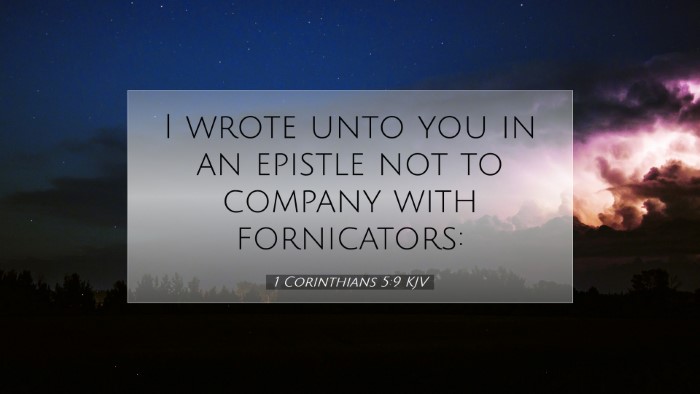Old Testament
Genesis Exodus Leviticus Numbers Deuteronomy Joshua Judges Ruth 1 Samuel 2 Samuel 1 Kings 2 Kings 1 Chronicles 2 Chronicles Ezra Nehemiah Esther Job Psalms Proverbs Ecclesiastes Song of Solomon Isaiah Jeremiah Lamentations Ezekiel Daniel Hosea Joel Amos Obadiah Jonah Micah Nahum Habakkuk Zephaniah Haggai Zechariah Malachi1 Corinthians 5:9
1 Corinthians 5:9 KJV
I wrote unto you in an epistle not to company with fornicators:
1 Corinthians 5:9 Bible Commentary
Commentary on 1 Corinthians 5:9
Verse Context:
1 Corinthians 5:9 states, "I wrote to you in my letter not to associate with sexually immoral people." This verse is part of a larger discourse by the Apostle Paul addressing issues of immorality and behavior within the church in Corinth.
Historical Background
The Corinthian church faced numerous challenges, many of which stemmed from the city's notorious reputation for moral laxity. Ancient Corinth was a hub of commerce and a melting pot of cultures, which contributed to a relaxed attitude towards morality. Paul's letter, therefore, provides not only a corrective measure for the church but also foundational instruction for the Christian community.
The Author: Paul
Apostle Paul, a former Pharisee and zealous persecutor of Christians, became one of the most influential apostles in spreading the Gospel. His letters are pastoral and doctrinal, filled with advice and admonitions for early churches. In 1 Corinthians, he seeks to address specific problems within the Corinthian church, emphasizing holiness and separation from immorality.
Exegesis of 1 Corinthians 5:9
- Letter of Warning:
- Paul indicates that he had previously communicated with the Corinthian believers regarding their associations with immoral people.
- This implies that there was an established expectation for behavior and a clear moral code the church was to uphold.
- Clarifying Misunderstandings:
- Some scholars interpret this verse as addressing a misunderstanding where the Corinthians may have believed they could engage with immoral people without compromising their Christian identity.
- Here, Paul distinguishes between "associating" with sinners, which is inevitable in a fallen world, and establishing close fellowship with those who live in unrepentant sin.
- Community Standards:
- Paul reinforces the concept of church discipline and the necessity of maintaining a standard of holiness among believers.
- This verse reminds the church that their testimony to the world is compromised when they fail to separate themselves from sin.
Theological Implications
The implications of Paul's directive are profound for contemporary Christians, church leaders, and theologians:
- Call to Holiness:
The call to holiness is not an option but a command for the followers of Christ; it reflects God's character and mission for His people.
- Understanding Grace:
This verse leads to a deeper understanding of grace. While grace covers sin, it does not condone it. Believers must understand the difference between grace and license.
- Maintenance of Church Discipline:
Churches today must grapple with the balance between grace and truth, ensuring that discipline is carried out in love while still holding to Biblical standards.
Insights from Public Domain Commentaries
Matthew Henry’s Commentary
Matthew Henry emphasizes the necessity for the church to maintain its purity. He writes that to "associate" with the immoral signifies a level of intimate fellowship that can corrupt the believer's morals and spiritual life. He posits that Paul’s admonition stresses the importance of the church’s integrity and the effects of unchecked sin on the congregation.
Albert Barnes’ Notes on the Bible
Albert Barnes highlights that the original letter referenced likely provided instructions that were firm yet necessary. He suggests that Paul wished to clarify that while believers interact with the world, they must not engage in practices that contradict their faith. Barnes interprets this as a protective measure for the faith community against harmful influences.
Adam Clarke’s Commentary
Adam Clarke elaborates on the nature of the immoral behavior Paul references and suggests that it reflects broader social attitudes in Corinth. He advocates for a radical distinction between the church and the society around it, urging believers not to appear as ‘friends of the world’ as this can ultimately lead to spiritual decay.
Conclusion
1 Corinthians 5:9 serves as a potent reminder of the church's mandate in a morally ambiguous world. It challenges pastors, students, and scholars to diligently pursue holiness, both personally and collectively. The commentary from historical figures sheds light on the timeless struggles of church accountability and integrity. It calls for a thoughtful engagement with the world that balances grace with truth, love with discipline, and acceptance with judgment.


